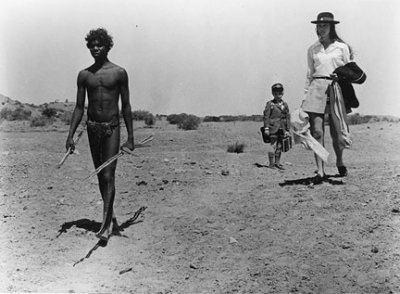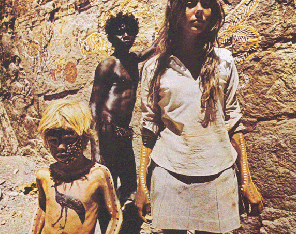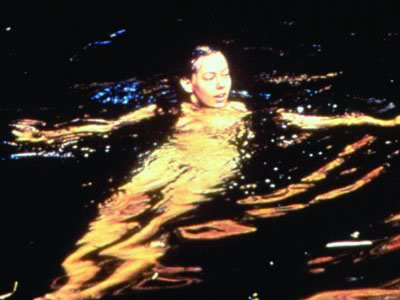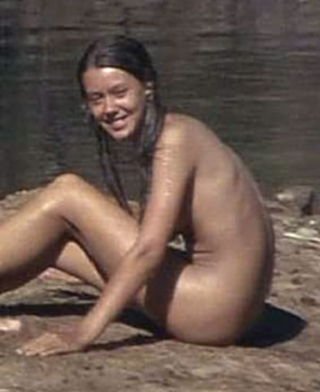 www.socalnaturist.org |
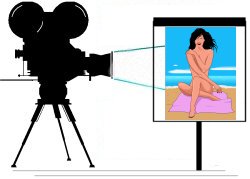
|
The Movie BuffTM:
|
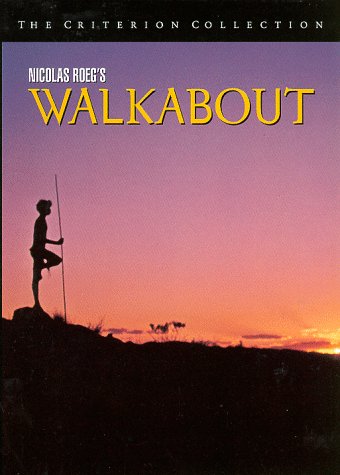
|
Name of Film:
Walkabout
Our Rating:
Drama, MPAA=Unrated, 100 min, Color, Available on DVD.
Nicolas Roeg's first solo outing as director, is a beautifully photographed film with a lush score by John Barry. Very few films achieve a kind of subliminal greatness with cross-cultural impact, but Walkabout is one of those films--a visual tone poem that functions more as an allegory than a conventionally plotted adventure.
Considered a cult favorite for years, Nicolas Roeg's 1971 film was originally released in the U.S. with an R rating, edited from its European length of 100 minutes. In 1997, the film was fully restored to its director's cut, and in its remastered video and DVD release, it's now wisely unrated (as Roeg had always intended) but still suitable for viewers of all ages. For parents this is a rare opportunity to treat well-supervised children (ages 5 and over) to an adventure that won't insult their intelligence, presenting scenes of frontal nudity and the hunting of animals in a context that invites valuable discussion and introspection.
Visually, the movie is simply breathtaking. If you're looking for an aesthetically pleasing panoramic spectacle, this movie is for you. The exotic wildlife, lush scenery, gorgeous sunsets, the music of John Barry & the lithe, nude form of Agutter all combine to create a visually stunning film. There are many parts that have a very surreal feel to them.
Walkabout is the mystical story of an Austalian sister and brother (played by Jenny Agutter, age 19 in her first feature film, and Lucien John, who is Roeg's own son) who are abandoned by their suicidal father in the harsh Australian outback. All the children know of the world is what the are learning in school, which means they are totally unprepared to survive in the semi-desert landscape and harsh environment as they attempt to walk back to civilization. As their courageous trek becomes grim, they are rescued by an Aborigine boy who has journeyed into the vast desert on his "walkabout"--a tribal initiation into manhood.
The story follows the two worlds colliding. The two children rely on young aborigine in order to survive, and although they cannot speak his language (or he speak theirs) a tenuous friendship begins to emerge. Contrasting their idyllic sojourn with scenes that convey the senseless violence of urban life, Roeg captures the conflict between natural instincts and "civilized" behavior. To a point, the children become primitives themselves, if only temporarily. But in the end, the young aborigine is unable to join his new "family" of civilization the children represent because the "civilized" girl consistently misinterprets the boy's native rituals as sexual advances, and this untimately leads to tragedy.
It is not without deliberate irony that, at the end, all Agutter's character can think about is how pleasant it was to live in the wild, swimming free with her Aborigine friend. It's a trenchant commentary on the nexus between innocence and living peacefully with nature.
Through exquisite cinematography and a story of subtle human complexity, the film continues to resonate on many thematic and artistic levels. Roeg had always intended it to be a cautionary morality tale, in which the limitations and restrictions of civilization become painfully clear. Now that several decades have passed since its release, Walkabout seems now like a film for the ages, hypnotic and open to several compelling levels of interpretation. There is a strong message here that we should be able to set aside our fixed expectations and 'understanding' of the world and be open to new ideas.
|
Review by Gary Mussell, SCNA Film Critic
Email Us Your Comments About This Review
